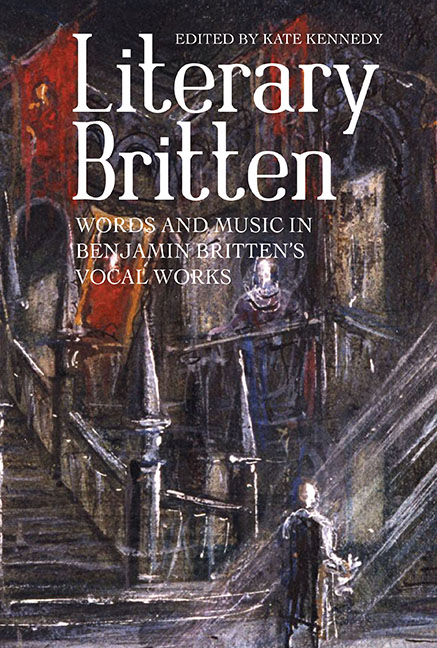Introduction
Published online by Cambridge University Press: 17 July 2019
Summary
The relationship between poetry and song, and indeed music and words more generally, is one of endless fascination, and one that raises endless questions. Both play with sounds, textures and rhythm within a form. Both share the same fundamental impulse – to communicate emotion. In fact some believe that words and music were intertwined for early man, with all speech being sung, as language developed. Glyn Maxwell puts it rather poetically: ‘the sound of form in poetry, descended from songs, moulded by breath, is the sound of that creature yearning to leave a mark’. The distinction between words and music is perhaps rather an artificial one – they are two genres yearning to be reunited. But while the synthesis of the two might appear to be natural, there are few composers who understand the many possibilities inherent in the linking of text and notes as well as Britten.
Britten set over ninety different writers, from John Donne to Arthur Rimbaud. What draws a composer to a text? Is it a response to its inherent musicality, a sense that its voices are looking for their natural music to be enhanced, or is it something about the conflict of the drama that lends itself particularly to musical setting? ‘As I read’, Britten said, ‘something often attracts my attention as being suitable for setting.’ Anxious to ameliorate any anxiety that the addition of music might tarnish the pre-existing poem, he reassures us that ‘in any case, the poem is still there to be read by itself, if someone doesn't like my music’. But if the texts are of sufficient quality, then they ought to have enough resilience and integrity to withstand a musical onslaught. As Mark Booth argues, words set for singing need to be robust, and possess ‘an internal discipline to maintain integrity in their cooperation and competition with the music’. Yet others disagree, suggesting that a poem is entirely subsumed when it is set to music: ‘Song is not a compromise between poetry and music, though the text taken by itself is a great poem; song is music … when a composer puts a poem to music he annihilates the poem and makes a song’.
- Type
- Chapter
- Information
- Literary Brittenwords and music in benjamin britten's vocal works the boydell, pp. 1 - 8Publisher: Boydell & BrewerPrint publication year: 2018

